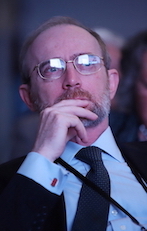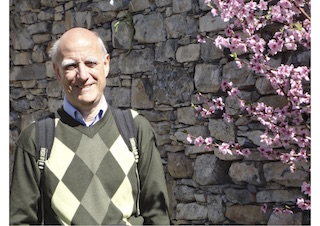Studiare
In questa sezione è possibile reperire le informazioni riguardanti l'organizzazione pratica del corso, lo svolgimento delle attività didattiche, le opportunità formative e i contatti utili durante tutto il percorso di studi, fino al conseguimento del titolo finale.
Calendario accademico
Il calendario accademico riporta le scadenze, gli adempimenti e i periodi rilevanti per la componente studentesca, personale docente e personale dell'Università. Sono inoltre indicate le festività e le chiusure ufficiali dell'Ateneo.
L’anno accademico inizia il 1° ottobre e termina il 30 settembre dell'anno successivo.
Calendario didattico
Il calendario didattico indica i periodi di svolgimento delle attività formative, di sessioni d'esami, di laurea e di chiusura per le festività.
| Periodo | Dal | Al |
|---|---|---|
| Primo semestre | 29-set-2008 | 17-gen-2009 |
| Secondo semestre | 23-feb-2009 | 30-mag-2009 |
| Sessione | Dal | Al |
|---|---|---|
| Sessione d'esame invernale | 19-gen-2009 | 21-feb-2009 |
| Sessione d'esame estiva | 3-giu-2009 | 31-lug-2009 |
| Sessione d'esame autunnale | 1-set-2009 | 26-set-2009 |
| Sessione | Dal | Al |
|---|---|---|
| Sessione di laurea invernale | 10-mar-2009 | 11-mar-2009 |
| Sessione di laurea estiva - I appello | 16-giu-2009 | 17-giu-2009 |
| Sessione di laurea estiva - II appello | 14-lug-2009 | 15-lug-2009 |
| Sessione di laurea autunnale- I appello | 20-ott-2009 | 21-ott-2009 |
| Sessione di laurea autunnale- II appello | 1-dic-2009 | 2-dic-2009 |
| Periodo | Dal | Al |
|---|---|---|
| Festa di Ognissanti | 1-nov-2008 | 1-nov-2008 |
| Festa dell'Immacolata Concezione | 8-dic-2008 | 8-dic-2008 |
| Vacanze di Natale | 22-dic-2008 | 6-gen-2009 |
| Vacanze di Pasqua | 10-apr-2009 | 14-apr-2009 |
| Festa della Liberazione | 25-apr-2009 | 25-apr-2009 |
| Festa del Lavoro | 1-mag-2009 | 1-mag-2009 |
| Festa del Santo Patrono | 21-mag-2009 | 21-mag-2009 |
| Festa della Repubblica | 2-giu-2009 | 2-giu-2009 |
| Vacanze estive | 8-ago-2009 | 16-ago-2009 |
| Descrizione | Periodo | Dal | Al |
|---|---|---|---|
| Primo semestre | Primo semestre | 29-set-2008 | 17-gen-2009 |
| Secondo semestre | Secondo semestre | 23-feb-2009 | 30-mag-2009 |
Calendario esami
Gli appelli d'esame sono gestiti dalla Unità Operativa Segreteria Corsi di Studio Scienze Umane.
Per consultazione e iscrizione agli appelli d'esame visita il sistema ESSE3.
Per problemi inerenti allo smarrimento della password di accesso ai servizi on-line si prega di rivolgersi al supporto informatico della Scuola o al servizio recupero credenziali
Per dubbi o domande leggi le risposte alle domande più frequenti F.A.Q. Iscrizione Esami
Docenti

Avezzu' Guido
 guido.avezzu@univr.it
guido.avezzu@univr.it
 alberto.cavarzere@univr.it
alberto.cavarzere@univr.it
 paola.dongili@univr.it
paola.dongili@univr.it
Giaretta Pierdaniele
 pierdaniele.giaretta@univr.it
pierdaniele.giaretta@univr.it
 0458028683
0458028683

Mastrocinque Attilio
 attilio.mastrocinque@univr.it
attilio.mastrocinque@univr.it
 +39 045802 8386
+39 045802 8386
 linda.napolitano@univr.it
linda.napolitano@univr.it

Pozzo Riccardo
 riccardo.pozzo@univr.it
riccardo.pozzo@univr.it
 +390458028053
+390458028053
Piano Didattico
Il piano didattico è l'elenco degli insegnamenti e delle altre attività formative che devono essere sostenute nel corso della propria carriera universitaria.
Selezionare il piano didattico in base all'anno accademico di iscrizione.
1° Anno
| Insegnamenti | Crediti | TAF | SSD |
|---|
1 Più insegnamenti a scelta per complessivi 18 crediti:2 Due o tre insegnamenti a scelta per complessivi 18 crediti:2° Anno Attivato nell'A.A. 2009/2010
| Insegnamenti | Crediti | TAF | SSD |
|---|
3 Due insegnamenti a scelta tra i seguenti:4 Due insegnamenti a scelta per complessivi 12 crediti:| Insegnamenti | Crediti | TAF | SSD |
|---|
1 Più insegnamenti a scelta per complessivi 18 crediti:2 Due o tre insegnamenti a scelta per complessivi 18 crediti:| Insegnamenti | Crediti | TAF | SSD |
|---|
3 Due insegnamenti a scelta tra i seguenti:4 Due insegnamenti a scelta per complessivi 12 crediti:Legenda | Tipo Attività Formativa (TAF)
TAF (Tipologia Attività Formativa) Tutti gli insegnamenti e le attività sono classificate in diversi tipi di attività formativa, indicati da una lettera.
Storia della filosofia medievale (m) (2008/2009)
Codice insegnamento
4S02290
Docente
Crediti
6
Offerto anche nei corsi:
- Storia della filosofia medievale (s) del corso Laurea specialistica in Filosofia - Ordinamento fino all'a.a. 2007/2008
Lingua di erogazione
Italiano
Settore Scientifico Disciplinare (SSD)
M-FIL/08 - STORIA DELLA FILOSOFIA MEDIEVALE
Periodo
Secondo semestre dal 23-feb-2009 al 30-mag-2009.
Sede
VERONA
Obiettivi formativi
conoscenza della filosofia medievale nel suo sviluppo storico (secoli V-XIV) e nella sua complessità tematica (logica, metafisica, teologia, etica, estetica, cosmologia, fisica, politica).
Programma
Prerequisiti: conoscenza della filosofia antica, specialmente platonica e aristotelica; preziosa, anche se non indispensabile, la conoscenza della lingua latina.
Contenuto del corso: Le principale teorie morali sviluppate nel secolo XII in ambito cristiano, ebraico e islamico. In particolare, verrà esaminato il pensiero di Abelardo, Maimonide, Avicenna e al-Ghazali, sullo sfondo della comune ma diversificata tradizione filosofica che ha formato alcuni tratti essenziali dello spirito occidentale.
Testi di riferimento:
Italo Sciuto, L’etica nel Medioevo, Einaudi, Torino 2007 (capitoli V-VI);
Abelardo, Etica, Bruno Mondadori;
Maimonide, Gli Otto Capitoli, Giuntina;
Avicenna, Metafisica, Trattato X, Utet;
Al-Ghazali, La bilancia dell’azione, Utet.
Metodi didattici: lezioni frontali, approfondimenti seminariali e lettura dei testi.
Modalità d'esame
Tesina su tema concordato e discussione orale sui testi di riferimento.
Tipologia di Attività formativa D e F
Insegnamenti non ancora inseriti
Prospettive
Avvisi degli insegnamenti e del corso di studio
Per la comunità studentesca
Se sei già iscritta/o a un corso di studio, puoi consultare tutti gli avvisi relativi al tuo corso di studi nella tua area riservata MyUnivr.
In questo portale potrai visualizzare informazioni, risorse e servizi utili che riguardano la tua carriera universitaria (libretto online, gestione della carriera Esse3, corsi e-learning, email istituzionale, modulistica di segreteria, procedure amministrative, ecc.).
Entra in MyUnivr con le tue credenziali GIA: solo così potrai ricevere notifica di tutti gli avvisi dei tuoi docenti e della tua segreteria via mail e a breve anche tramite l'app Univr.
Competenze linguistiche
I crediti formativi universitari relativi alle "Ulteriori competenze linguistiche" (B1 informatizzato se seconda lingua; livello B2 completo se stessa lingua della triennale) possono essere acquisiti in una delle due seguenti modalità:
- iscrizione da parte della/o studente presso il Centro Linguistico di Ateneo (CLA ➔ https://cla.univr.it/it/test-e-certificazioni) per il sostenimento e il superamento delle prove + iscrizione, sempre da parte della/o studente, in apposita lista per la registrazione crediti e registrazione CFU (senza presenza) da parte dell’Università.
Oppure
- equipollenza di certificazioni linguistiche esterne: riconoscimento equipollenza di certificazioni linguistiche esterne (➔ https://cla.univr.it/it/servizi/riconoscimento-delle-certificazioni-linguistiche-esterne).
Gestione carriere
Esercitazioni Linguistiche CLA
Tirocini
LINEE GUIDA TIROCINIO CURRICOLARE
CdS LM IN SCIENZE FILOSOFICHE (LM 78)
PER STUDENTI IMMATRICOLATE/I A PARTIRE DALL’A.A. 2018-2019
(NUOVO ORDINAMENTO DI SCIENZE FILOSOFICHE)
Documento redatto dalla Commissione Tirocini:
Prof. Davide Poggi: presidente della Commissione;
Prof.ssa Laura Anna Macor: referente del CdS LM in Scienze Filosofiche, componente della Commissione Tirocini e Referente alla Mobilità internazionale per i CdS di area filosofica;
Prof. Alessandro Stavru, componente della Commissione Tirocini con funzione di segretario verbalizzante.
- OBIETTIVI FORMATIVI
L’obiettivo del Tirocinio obbligatorio è quello di:
- stimolare in vivo la capacità di valutazione autonoma e critica delle/degli studenti;
- favorire l’applicazione degli strumenti teoretici e metodologici e l’attualizzazione delle teorie etiche, politiche ed estetiche apprese nel biennio magistrale (anche e soprattutto in maniera interdisciplinare);
- declinare le competenze acquisite durante il percorso di studi (learning) nei vari contesti (dai Centri di ricerca agli ambiti extra-accademici) in cui le/gli studenti si troveranno a operare (experience), facendo di questi ultimi una preziosa fonte di arricchimento delle prime (experiential learning).
Vengono così incentivati, nel quadro generale di una maggior professionalizzazione della/del laureata/o in Scienze Filosofiche:
- l’acquisizione e il perfezionamento della capacità di allacciare e gestire collaborazioni con contesti lavorativi e/o Centri di ricerca/fondazioni/istituzioni culturali del territorio e, conseguentemente,
- la capacità di gestire le dinamiche socio-comunicative in contesti di ricerca e lavorativi,
- l’inserimento nel mondo del lavoro.
Ne deriverà altresì una maggior coscienza critica, da parte della/o studente, delle Risorse del Territorio, delle relative esigenze e degli strumenti connessi con il proprio ruolo/professione.
- MODALITÀ DI SVOLGIMENTO
Le/gli studenti iscritte/i alla Magistrale in Scienze Filosofiche (LM 78), nel corso del secondo anno del biennio formativo (come previsto dal piano didattico), possono svolgere il proprio tirocinio curricolare di almeno 150 ore pari a 6 cfu di tipo F,[1] secondo le seguenti modalità:
1.MODALITÀ TRADIZIONALE
La/lo studente individua un Ente accreditato (o da accreditare si vedano in merito le indicazioni disponibili online ai seguenti URL, cui si rimanda:
2.https://www.univr.it/it/i-nostri-servizi/stage-e-tirocini/come-attivare-uno-stage), nel cui contesto diventa possibile svolgere il proprio tirocinio curricolare sulla base della disponibilità dell’Ente e, nel caso in cui questa sussista, di un progetto formativo concordato fra Ente e Università (per la verifica delle possibilità già esistenti, si segua il percorso su esse3: Sito Docente à Verbali Esami à Tirocini à Opportunità e Aziende).
Ci dovrà essere un referente interno all’ente ospitante (chiamato Tutor aziendale) e una/un referente interna/o all’Università (una/un docente afferente al Corso di Studi di appartenenza, chiamato Tutor accademico).
Nella fase di pianificazione della propria attività di Tirocinio curricolare, le/gli studenti possono trovare sostegno anche nella figura del Tutor studentesco di CdS (se attivo nel periodo di svolgimento del tirocinio) che è messo a disposizione delle/degli studenti per il loro accompagnamento in itinere (tra i compiti del Tutor studentesco di CdS vi è infatti l’accompagnamento della/o studente nella scelta dell'ente/organizzazione, nella supervisione della pianificazione del Tirocinio curricolare e nello svolgimento dello stesso).
Infine, la/lo studente dovrà contattare l'Ufficio Stage e Tirocini per l'espletamento delle pratiche iniziali di avviamento del Tirocinio, specificando che si tratta di Tirocinio curricolare da svolgersi nel contesto della Laurea Magistrale in Scienze Filosofiche.
Vi possono essere variazioni di orario od altro rispetto a quanto inizialmente concordato e sottoscritto (da comunicare secondo le modalità indicate nel documento che viene rilasciato alla/o studente tirocinante dall’Ufficio Stage e che corrisponde alla sezione “Gestione periodo” ne “I miei tirocini” su esse3).
L’esperienza di tirocinio va accompagnata e monitorata per mezzo di:
- strumenti somministrati durante e/o successivamente all’esperienza stessa (questionario di qualità dell’esperienza di tirocinio);
- colloqui periodici con il Tutor accademico con cui la/lo studente ha elaborato il proprio progetto formativo e pianificato l’attività di tirocinio curricolare; per quanto il Tutor accademico resti il riferimento prioritario, sono possibili anche colloqui con il Tutor studentesco messo a disposizione dal CdS (se attivo nel periodo di svolgimento del tirocinio);
- la compilazione, da parte della/del tirocinante, di un “diario di bordo” (da consegnare poi, alla fine del percorso di tirocinio, al Tutor accademico e alla Commissione Tirocini), che consente al/alla studente una costante riflessione sulla propria esperienza, costituendo la base per la stesura della relazione scritta finale (di cui al punto successivo) e, eventualmente, qualora appaia utile ed opportuno, della tesi magistrale;
- una relazione scritta che, solitamente al termine del tirocinio, viene consegnata al Tutor accademico, dando forma unitaria e sistematica alle esperienze raccolte nel “diario di bordo”: tale relazione (di max 20.000 battute; carattere: Times New Roman; dimensioni carattere: 12 pt.; interlinea: 1,5; testo giustificato) deve illustrare l’obiettivo del tirocinio (il progetto formativo eventualmente concordato con l’Ente), la coerenza tra quest’ultimo e le attività svolte, che cosa si ritiene di aver appreso, punti di forza e aree di miglioramento del tirocinio stesso (così che ogni relazione costituisca un feedback volto all’implementazione dell’attività formativa del Tirocinio curricolare e delle relazioni tra Università ed Ente).
L'Ufficio Stage e Tirocini, al termine dell'esperienza, notifica al Tutor accademico l'atto di carriera da approvare in esse3 (lato docente). Il docente approverà l'atto solo DOPO aver visto la relazione e il diario di bordo e dopo aver dato una valutazione di “approvazione/non approvazione”.
Il Tutor accademico dovrà poi comunicare tale giudizio di "approvazione/non approvazione" (mettendo in cc la/lo studente stessa/o) alla Commissione Tirocini, la quale prenderà atto dell’esito e terrà traccia dell’esperienza di tirocinio.
La conclusione del tirocinio, dal punto di vista burocratico, avviene secondo quanto indicato online all’URL: https://www.univr.it/it/i-nostri-servizi/servizi-per-aziende/stage-e-tirocini/il-riconoscimento-dei-crediti-formativi-universitari-aziende).
2.TIROCINIO “COLLABORAZIONE CON I CENTRI DI RICERCA DIPARTIMENTALI”
In questa modalità del tirocinio curricolare, le/gli studenti svolgono la propria esperienza “internamente” al Dipartimento di Scienze Umane, nel contesto dei Centri di ricerca legati al Corso di Laurea in Filosofia (nonché, più in generale, di afferenza del DipSUM) e nel quadro delle loro attività e interessi.
Nella misura in cui tali Centri (reperibili sulla seguente pagina web: https://sites.dsu.univr.it/portal/) abbiano iniziative in corso, che li mettano in contatto con Enti o altri Centri esterni all’Ateneo e siano rivolte alla ricerca e/o alla terza missione (quindi in stretto rapporto con la cittadinanza e il Territorio), le/gli studenti potranno partecipare alle attività dei Centri, cooperare al loro allestimento e alla loro conduzione, nonché alla disseminazione esterna dei risultati delle ricerche. Saranno accompagnati dalle figure 1) del Direttore del Centro ricerche scelto per la propria esperienza (che rivestirà il ruolo di Tutor aziendale) e 2) da un docente afferente al CdS Magistrale in Scienze Filosofiche e membro del Centro ricerche in questione (che rivestirà il ruolo di Tutor accademico). Le mansioni e i ruoli delle/degli studenti tirocinanti dovranno essere concordate tra Direttore del Centro ricerche, Tutor accademico e studenti tirocinanti e formalizzate in un progetto formativo.
Il Centro ricerche figurerà come una nuova sede operativa appartenente “all'azienda” Università di Verona e il Direttore del Centro ricerche dovrà registrarsi per ottenere credenziali proprie con cui operare sulla piattaforma esse3. In particolare potrà inserire progetti formativi diretti (per studenti già selezionate/i) o opportunità aperte cui le/gli studenti potranno candidarsi. Per l’espletamento delle pratiche iniziali di accreditamento e di avviamento del Tirocinio, le/gli studenti e le/i docenti del CdS potranno contattare l'Ufficio Stage e Tirocini e ricevere adeguata assistenza, specificando che si tratta di un Tirocinio curricolare “interno”, svolto nell’ambito delle attività di uno dei Centri di ricerca dipartimentali.
Il monte ore dell’esperienza di Tirocinio è, come nella modalità “tradizionale”, di almeno 150 ore (pari a 6 cfu di tipo F), estendibili come da nota 1 alla fine della presente pagina web.
Vi possono essere variazioni di orario od altro rispetto a quanto inizialmente concordato e sottoscritto (da comunicare secondo le modalità indicate nel documento che viene rilasciato alla/o studente tirocinante dall’Ufficio Stage e che corrisponde alla sezione “Gestione periodo” ne “I miei tirocini” su esse3).
Nel quadro generale degli obiettivi formativi del Tirocinio curricolare e coerentemente con essi, tale specifica tipologia di tirocinio:
- inserisce le/gli studenti in progetti di ricerca e iniziative di terza missione;
- permette loro di sviluppare competenze relative alla conduzione di indagini e alla gestione di eventi/iniziative filosofico-culturali;
- permette loro di sviluppare competenze relative all’allestimento e all’erogazione, in gruppo, di attività concernenti le discipline e le pratiche filosofiche.
L’esperienza di tirocinio della/o studente sarà monitorata per mezzo:
- della compilazione, da parte della/o studente tirocinante, di un “diario di bordo” (con dettaglio delle ore dedicate al progetto, da consegnare, alla fine del percorso di tirocinio, al Tutor accademico e alla Commissione Tirocini), che consente alla/o studente un costante ritorno critico sulla propria esperienza, costituendo la base per la stesura della relazione scritta finale (di cui al punto successivo) ed, eventualmente, qualora appaia utile ed opportuno della tesi magistrale;
- di una breve relazione scritta che, solitamente al termine del tirocinio, lo studente consegna al Tutor accademico, dando forma unitaria e sistematica alle esperienze raccolte nel “diario di bordo”: tale relazione (di max 20.000 battute) deve illustrare l’obiettivo del tirocinio e del progetto formativo, la coerenza tra quest’ultimo e le attività svolte, che cosa si ritiene di aver appreso, punti di forza e aree di miglioramento del tirocinio stesso (affinché ogni relazione costituisca un feedback volto all’implementazione dell’attività formativa del tirocinio interno).
L'Ufficio Stage e Tirocini, al termine dell'esperienza, notifica al Tutor accademico l'atto di carriera da approvare in esse3 (lato docente). Il docente approverà l'atto solo DOPO aver visto la relazione e il diario di bordo e dopo aver dato una valutazione di “approvazione/non approvazione”.
Il Tutor accademico dovrà poi comunicare tale giudizio di "approvazione/non approvazione" (mettendo in cc la/lo studente stessa/o) alla Commissione Tirocini, la quale prenderà atto dell’esito e terrà traccia dell’esperienza di tirocinio.
La conclusione del tirocinio, dal punto di vista burocratico, avviene secondo quanto indicato online all’URL: https://www.univr.it/it/i-nostri-servizi/servizi-per-aziende/stage-e-tirocini/il-riconoscimento-dei-crediti-formativi-universitari-aziende).
3.TIROCINIO ALL’ESTERO
Il tirocinio potrà essere svolto anche all'estero, nel contesto dei programmi di incentivazione dell'internazionalizzazione del CdS in Scienze Filosofiche.
Tale tipologia di tirocinio consiste:
a. nel cosiddetto "Erasmus+ Tirocinio", che offre alle/agli studenti l'opportunità di effettuare un'esperienza di tirocinio all'estero presso aziende/imprese pubbliche o private, università, centri di ricerca, organizzazioni no-profit, scuole di ogni ordine e grado con sede in Europa, usufruendo di una borsa di studio a sostegno delle spese di mobilità.
L'Ufficio Mobilità internazionale, in collaborazione con l'Ufficio Stage e Tirocini, si occupa della pubblicazione del bando di selezione annuale "a sportello", generalmente con più di una finestra temporale per la presentazione delle domande, e della gestione amministrativa dei programmi (stipula di accordi bilaterali, contatti con l'Agenzia Nazionale Erasmus+, gestione fondi). Vi è ampia flessibilità nella scelta della sede ove svolgere il tirocinio: la/o stessa/o studente può infatti individuare in autonomia la sede che meglio si adatta alle esigenze formative e professionalizzanti per la sua attività di tirocinio. Il bando, insieme a tutta la documentazione necessaria alla conoscenza del programma e alla presentazione delle candidature, è disponibile, in versione aggiornata di anno in anno, al link: https://www.univr.it/it/i-nostri-servizi/internazionalizzazione/studiare-all-estero-international-students/erasmus-e-altre-esperienze-all-estero.
Possono partecipare solo le/gli iscritte/i a tempo pieno e in regola con le tasse. Si ricorda alle/agli studenti che anche tale tipologia di Tirocinio va effettuata secondo la tempistica prevista dal piano di studi, ossia nel corso del secondo anno del biennio magistrale. Tale tirocinio (presso Aziende, Fondazioni culturali, Centri di ricerca e Università) ha una durata che va da un minimo di 2 mesi a un massimo, variabile a seconda del bando, di 3-5 mesi e può essere considerato – dietro parere del Collegio didattico – "mobilità per ricerca tesi". I CFU minimi da accreditare al rientro sono 4 per ciascun mese di mobilità. A seconda del numero dei CFU acquisiti, il loro riconoscimento potrà essere totale o parziale;
b. nel Programma di tirocinio del Ministero Affari Esteri e della Cooperazione Internazionale (MAECI) promosso dalla Fondazione CRUI, che permette alle/agli studenti iscritte/i a Corsi di Laurea Magistrale e Magistrale a ciclo unico di partecipare alla selezione per lo svolgimento di tirocini curriculari presso Ambasciate, Rappresentanze permanenti presso le OO.II., Consolati e Istituti italiani di Cultura (IIC) in tutto il mondo, acquisendo una conoscenza diretta e concreta delle attività istituzionali svolte dal Ministero degli Affari Esteri e della Cooperazione Internazionale (MAECI). Nello specifico, le/gli studenti di LM-78 in Scienze Filosofiche possono accedere al bando per tirocini in IIC. I tirocini prevedono una durata di tre mesi e sono prorogabili di un ulteriore mese, d’intesa tra la Sede ospitante, la/il tirocinante e l’Università di provenienza della/o studente. I tirocini comportano il riconoscimento di almeno 1 credito formativo universitario (CFU) per ciascun mese di attività effettiva, ferma restando la valutazione del periodo formativo di competenza degli Atenei di riferimento. Nel caso specifico del Tirocinio curricolare per la LM in Scienze Filosofiche, il Collegio Didattico di Filosofia ha approvato il riconoscimento dei 6 CFU richiesti per il tirocinio curricolare. Le relative informazioni sono disponibili al link: https://www.univr.it/it/i-nostri-servizi/servizi-per-aziende/stage-e-tirocini/programmi-di-stage-all-estero-aziende#categdoc_1509.
4.CASI PARTICOLARI (studenti lavoratrici/lavoratori e altro)
A fronte del fatto che la Laurea Magistrale in Scienze Filosofiche annovera studenti che hanno esperienze/rapporti di tipo lavorativo già in corso, La Commissione Tirocini si riserva di esaminare la situazione di ogni studente che si appresti ad avviare il proprio tirocinio formativo, così da studiare le soluzioni più adeguate ai singoli casi. Tra le soluzioni possibili che la Commissione ha studiato per la/lo studente che voglia/debba conciliare la propria attività lavorativa con il tirocinio curricolare, vi sono:
a. il Project Work: la/lo studente, in accordo con il Tutor accademico e l’Ente presso il quale lavora, redige un progetto, interno alla propria azienda, finalizzato all’applicazione delle competenze acquisite durante il proprio percorso formativo filosofico. Tale Project work è svolto essenzialmente da casa e riguarda l’ambiente lavorativo della/o studente (a titolo esemplificativo, può trattarsi di implementare qualche processo o buona pratica relativi al proprio ambiente di lavoro, di implementare un servizio sperimentale, elaborare un'analisi particolare, etc.). La compilazione, da parte della/o studente-lavoratrice/lavoratore tirocinante, di un “diario di bordo” (con dettaglio delle ore dedicate al progetto, da consegnare, alla fine del percorso di tirocinio, al Tutor accademico e alla Commissione Tirocini) e di una relazione scritta (di minimo 40.000 battute e max 60.000 battute – carattere: Times New Roman; dimensioni carattere: 12 pt.; interlinea: 1,5; testo giustificato – da consegnare al Tutor accademico e alla Commissione Tirocini al termine del Project Work) mostreranno l’eventuale raggiungimento dell’obiettivo che la/lo studente si era preposta/o e la coerenza tra quest’ultimo e le attività svolte e saranno oggetto di valutazione (“approvazione/non approvazione) da parte del Tutor accademico ai fini dell’assegnazione dei 6 CFU obbligatori. Il Tutor accademico dovrà poi comunicare il proprio giudizio di "approvazione/non approvazione" (mettendo in cc la/lo studente stessa/o) alla Commissione Tirocini, la quale, preso atto dell’esito, nella persona del suo Presidente, provvederà a inoltrare agli Uffici la richiesta di riconoscimento dell'Attività di Tirocinio Curricolare (mediante inserimento tra le pratiche studenti messe in approvazione in occasione del primo Collegio Didattico utile), ai fini di registrazione in carriera dei corrispondenti 6 CFU – TAF F.
b. l’attivazione del percorso di tirocinio nell'azienda stessa nella quale la/lo studente lavora. Questa soluzione è possibile per coloro che effettuano un lavoro in modalità part time (o altre tipologie analoghe). L’attivazione segue la normale procedura di attivazione del tirocinio, ma nel rispetto delle seguenti regole: il tirocinio deve essere distinto dall'orario lavorativo (la non sovrapponibilità dei due ruoli è connessa a problemi di carattere assicurativo e di controllo ispettivo) e deve portare a termine un progetto che esuli dalla normale attività lavorativa per la quale la/lo studente-lavoratrice/lavoratore è già formata/o. Si tratta quindi di ricoprire una mansione diversa, oppure, mantenendo la stessa mansione, di assumere un ruolo differente. La compilazione, da parte della/o studente-lavoratrice/lavoratore tirocinante, di un “diario di bordo” (con dettaglio delle ore dedicate al progetto, da consegnare, alla fine del percorso di tirocinio, al Tutor accademico e alla Commissione Tirocini) e di una relazione scritta (di max 20.000 battute – carattere: Times New Roman; dimensioni carattere: 12 pt.; interlinea: 1,5; testo giustificato – da consegnare anch’essa al Tutor accademico e alla Commissione Tirocini) evidenzierà l’eventuale raggiungimento dell’obiettivo che la/lo studente si era prefissata/o e la coerenza tra quest’ultimo e le attività svolte. Il “diario di bordo” e la relazione scritta saranno oggetto di valutazione (“approvazione/non approvazione”) da parte del Tutor accademico ai fini dell’assegnazione dei 6 CFU obbligatori.
L'Ufficio Stage e Tirocini, al termine dell'esperienza, notifica al Tutor accademico l'atto di carriera da approvare in esse3 (lato docente). Il docente approverà l'atto solo DOPO aver visto la relazione e il diario di bordo e dopo aver dato una valutazione di “approvazione/non approvazione”. Il Tutor accademico dovrà poi comunicare tale giudizio di "approvazione/non approvazione" (mettendo in cc la/lo studente stessa/o) alla Commissione Tirocini, la quale prenderà atto dell’esito e terrà traccia dell’esperienza di tirocinio.
Altri casi che debordino dalle situazioni precedentemente descritte e normate saranno discussi dalla Commissione Tirocini, la quale terrà conto di eventuali esigenze specifiche delle/degli studenti interessate/i e provvederà a studiare con loro soluzioni ad hoc e a sottoporle all’approvazione del Collegio Didattico di Filosofia.
Per altre informazioni in merito alle procedure per svolgere il tirocinio, è possibile contattare l'Ufficio Stage e Tirocini.
- MODALITÀ DI INFORMAZIONE/DIFFUSIONE/PUBBLICIZZAZIONE
Parte essenziale del tirocinio curricolare è l’incentivazione dell’iniziativa personale e della proattività delle/degli studenti, le/i quali saranno così chiamate/i, in base alle proprie inclinazioni e ai propri interessi, a costruire/stringere una rete di legami con il Territorio (nelle sue più ampie determinazioni: area geografica di provenienza, altre regioni, contesto nazionale), sia attingendo alla banca dati di Ateneo (nella quale sono presenti oltre 12.500 Enti già accreditati per i tirocini), sia proponendo a sua volta nuovi accreditamenti.
Al fine di rendere consapevole le/gli studenti di queste possibilità d’azione/scelta, nonché delle norme generali riguardanti l’attività di tirocinio più in generale, la Commissione Tirocini, avvalendosi della collaborazione dell’Ufficio Stage-Tirocini dell’Ateneo e del Tutor studentesco della Laurea Magistrale, organizzerà incontri informativi nel contesto degli insegnamenti obbligatori (o, in alternativa, all’interno degli insegnamenti che risultano maggiormente frequentati) in entrambi i semestri di ogni anno accademico, ritenendo questa soluzione la più adeguata per raggiungere il maggior numero di studenti possibile relativamente a coloro che, di volta in volta, sono iscritte/i al primo anno della LM e a coloro che si apprestano a iniziare il secondo e ultimo anno.
[1] Fatto salvo il monte ore minimo (150), si ha sempre la possibilità di gestire liberamente la durata della propria esperienza di tirocinio, estendendola e vedendosi riconosciuti i corrispondenti CFU in esubero o fuori piano, oppure in ambito D (senza che essi possano fare media). Tale riconoscimento in ambito D è possibile, da Regolamento di Ateneo, senza limitazioni (quindi per l'intero ammontare dei CFU previsti in questo ambito). La richiesta di prolungamento dell’attività di tirocinio (in special modo se connessa al riconoscimento dei relativi CFU in ambito D) deve tuttavia essere sostenuta da adeguate motivazioni (che ne esplicitino e argomentino l’importanza ai fini del raggiungimento o del perfezionamento del progetto formativo legato al tirocinio), motivazioni che il Tutor accademico incaricato di seguire la/lo studente tirocinante si riserva di esaminare e valutare congiuntamente alla Commissione Tirocini.
PROCEDURA ACCREDITAMENTO AZIENDE
PRECEDENTI LINEE GUIDA TIROCINIO CURRICOLARE
DSU17 MODULO RICHIESTA SOSTITUZIONE TIROCINIO SC FILOSIFICHE
Prova Finale
Caratteristiche della prova finale:
(a) La prova finale per il conseguimento del titolo consiste nella discussione di un elaborato scritto, indicativamente di circa 150 cartelle, su un argomento concordato con la/il relatrice/tore e coerente con il percorso prescelto. Alla prova finale sono riservati 18 (diciotto) CFU.
(b) La decisione di voto avviene senza la presenza della/o studente o di estranei. La Commissione di Laurea dispone di 110 (centodieci) punti; il voto minimo per il superamento dell’esame è di 66 (sessantasei) su 110. Il voto di partenza è dato dalla media ponderata dei voti degli esami rapportata a 110. Alla prova finale è attribuito il punteggio massimo di 7 (sette) punti su 110.
(c) Il Collegio Didattico di Filosofia incentiva il compimento degli studi nella durata normale del corso (ovvero nella durata concordata, per le/gli studenti a tempo parziale), nonché l’internazionalizzazione assegnando:
- 2 (due) punti su 110 aggiuntivi a chi si laurei nelle sessioni dell’ultimo anno di corso;
- 2 (due) punti su 110 aggiuntivi a chi abbia conseguito almeno 2 CFU all’estero.
(d) Quando la/il candidata/o abbia ottenuto il massimo dei voti, può essere concessa la lode, purché con decisione unanime da parte dei membri della Commissione di Laurea.
(e) L’elaborato scritto, oggetto della prova finale, può essere redatto in una lingua diversa dall’italiano, previa approvazione della/del relatrice/tore e del Collegio Didattico. La discussione deve comunque essere condotta in italiano.
(f) La/o studente può ritirarsi dall’esame finale fino al momento di essere congedata/o dalla/dal Presidente della Commissione per dare corso alla decisione di voto.
Media dei voti d’esame: in conformità al Regolamento Didattico di Ateneo, in vista della determinazione del voto di laurea, la media dei voti d’esame è calcolata tenendo conto di tutte le prove (in qualsiasi ambito del Piano di Studio individuale siano inserite), con l’esclusione degli eventuali esami in soprannumero, che diano luogo a un voto espresso in trentesimi. Tale media è ponderata in base al numero di CFU corrispondenti a ciascuna prova.
Designazione delle/dei relatrici/tori: può essere relatrice/tore di elaborati per il conseguimento della Laurea Magistrale in Scienze Filosofiche ogni docente dell’Ateneo, purché la/o studente abbia superato un esame in una disciplina del settore scientifico disciplinare di afferenza della/del docente stessa/o.
Composizione delle Commissioni per la prova finale: le commissioni sono nominate dalla/dal Presidente del Collegio Didattico e sono composte da non meno di cinque docenti dell’Ateneo per l’esame di laurea magistrale in Scienze Filosofiche; possono altresì far parte della Commissione di Laurea, in soprannumero e limitatamente alla discussione degli elaborati di cui sono correlatrici/tori, anche docenti ed esperte/i esterne/i. La/Il Presidente della Commissione è la/il professoressa/ore di ruolo di più alto grado accademico.
Documenti
| Titolo | Info File |
|---|---|
|
|
pdf, it, 99 KB, 13/10/23 |
|
|
pdf, it, 101 KB, 10/04/24 |
Elenco delle proposte di tesi e stage
| Proposte di tesi | Area di ricerca |
|---|---|
| Linguaggio e mito in Tolkien | ENGLISH LITERATURE - Critical Theory & Poetics |
| Dialettica del negativo in Meister Eckhart | HISTORY OF PHILOSOPHY - MIDDLE AGES |
| La felicità nel Medioevo | HISTORY OF PHILOSOPHY - MIDDLE AGES |
| Le figure di Eva e Maria in Ildegarda di Bingen | HISTORY OF PHILOSOPHY - MIDDLE AGES |
| IA. Una critica fenomenologica al concetto di Intelligenza Artificiale | The Human Mind and Its Complexity: Cognitive science, psychology, linguistics, philosophy of mind - Philosophy of science, epistemology and logic |
Guide operative per lo studente
In questa pagina lo studente potrà trovare delle guide operative, utili al completamento del proprio percorso universitario, che vanno ad integrare quanto già indicato nei Regolamenti didattici del CdS.
1- Qui si possono reperire indicazioni in merito ai riconoscimenti di carriera, ai crediti a libera scelta per lo studente e alle certificazioni linguistiche per gli studenti iscritti ai CdS afferenti al Dipartimento di Scienze Umane a partire dalla coorte 2022 (le indicazioni contenute nella Guida entrano in vigore dal 29 marzo 2023 e sono retroattive solo se a favore dello studente);
2 - Qui si possono reperire indicazioni in merito ai riconoscimenti di carriera, ai crediti a libera scelta per lo studente e alle certificazioni linguistiche per gli studenti iscritti ai CdS afferenti al Dipartimento di Scienze Umane a partire dalla coorte 2014 (le indicazioni contenute nella Guida entrano in vigore dal 29 aprile 2020 e sono retroattive solo se a favore dello studente);
3 - Qui si possono reperire indicazioni in merito al conseguimento dei crediti a libera scelta (Crediti D e F) per gli studenti iscritti ai i CdS afferenti al Dipartimento di Scienze Umane fino alla coorte 2013 (le indicazioni contenute nella Guida entrano in vigore dal 23 febbraio 2011 e sono retroattive solo se a favore dello studente).
Documenti
| Titolo | Info File |
|---|---|
|
|
pdf, it, 325 KB, 02/05/23 |
|
|
pdf, it, 212 KB, 02/05/23 |
|
|
pdf, it, 131 KB, 02/05/23 |
Tutorato per gli studenti
Gli iscritti al CdS in Scienze filosofiche possono rivolgersi al personale docente nell'orario di ricevimento per parlare delle eventuali difficoltà di cui fanno esperienza nel cammino formativo, nell’organizzazione del piano didattico, nella preparazione degli esami e in tutte le altre situazioni in cui può essere utile farsi aiutare nelle proprie scelte o ricevere un consiglio da persone consapevoli dei vari dettagli della vita accademica, dei processi e dell’architettura del CdS.
I docenti indicati come tutor del corso di laurea magistrale in Scienze filosofiche sono:
- prof.ssa Laura Anna Macor (Referente fino al 30/09/2024);
- prof. Lorenzo Bernini;
- prof.ssa Olivia Guaraldo.
Nel quadro del programma di TUTORATO, il Dipartimento di Scienze Umane ha inoltre deciso di utilizzare l’esperienza di alcuni iscritti al Dottorato in Ricerca in Scienze Umane (curriculum filosofico) per offrire un supporto che sia il più vicino possibile a chi frequenta il CdS magistrale, sulla base della loro diretta esperienza.
Tali Tutor studenteschi di CdS forniranno un servizio di orientamento, sia in ingresso (vòlto a favorire un migliore inserimento nei Corsi di Studio, ovviando alle difficoltà e agli ostacoli che il passaggio dalla Triennale alla Magistrale, inevitabilmente comporta), sia in itinere, così da offrire un servizio di sostegno che sappia adeguatamente interpretare e rispondere alle esigenze di formazione e professionalizzazione, nonché alla sensibilità di chi frequenta i CdS filosofici.
Tra i compiti e le attività previste vi sono:
- Sostegno nella compilazione dei piani didattici, consulenza nella risoluzione di problemi amministrativi (reperimento informazioni sul sito web di Ateneo);
- Individuazione e suggerimento di Uffici e Responsabili competenti in relazione alle questioni segnalate, etc.;
- Aiuto per una migliore e più agile gestione del proprio iter formativo (supporto in merito all’accesso e alla fruizione della didattica on-line attraverso gli strumenti messi a disposizione dall’Ateneo);
- Accompagnamento della/o studente dalla scelta dell'ente/organizzazione alla supervisione nella pianificazione e nello svolgimento dell'attività di Tirocinio curricolare;
- Orientamento delle/degli studenti (inclusa la scelta della/del relatrice/tore) in vista della prova finale di laurea;
- Svolgere attività di orientamento delle future matricole (su appuntamento via Zoom) coordinata dall’Ufficio Orientamento anche tramite incontri nei mesi di settembre e ottobre;
- Gestione delle pagine social dedicate alle/agli studenti;
- Tutorial a distanza per supporto metodo di studio/tesi;
- Gestione di appuntamenti con matricole (mesi di settembre/ottobre);
- Orientamento della/o studente all’uso del supporto prodotto dal sistema bibliotecario di Ateneo e aiuto alle/ai laureandi per reperire le fonti bibliografiche in caso consultazione materiale bibliografico non disponibile on-line;
- Indagine per la rilevazione di difficoltà dovute all'emergenza in corso;
- Tutorial per il sito del CdS di riferimento;
- Diffusione/pubblicizzazione di comunicazioni/informazioni di maggior importanza/utilità relativamente al CdS e alle sue attività/iniziative (bandi di tutorato/bandi di internazionalizzazione/etc.).
Tali Tutor studenteschi, tramite la casella di posta elettronica istituzionale, cercheranno di raggiungere le/gli iscritte/i del primo anno per organizzare con queste/i ultime/i una serie di colloqui informali e programmare eventuali iniziative sotto la supervisione dei Tutor accademici.
Per l'a.a. 2023-2024 è stato nominato Tutor per il CdS in Scienze Filosofiche Francesco Pedrazzoli (francesco.pedrazzoli@univr.it), che riceve ogni martedì dalle 15.00 alle 16.00 e ogni venerdì dalle 10.00 alle 11.00 in Aula Seminari 2 (Palazzo di Lettere, Secondo piano). Il ricevimento del martedì inizierà il 10 ottobre e quello del venerdì il 20 ottobre. Il Tutor è comunque disponibile per ricevimenti su appuntamento. Eventuali variazioni di giorno e/o orario saranno comunicate con il dovuto anticipo mediante avvisi sulla pagina web di Ateneo. Si consiglia, in ogni caso, di prendere contatto via mail con il Tutor anticipando brevemente le ragioni del ricevimento. Inoltre, il Tutor è sempre disponibile per incontri su appuntamento, al fine di garantire a tutte/i le/gli studenti accesso al servizio.
Area riservata studenti
Attività
La presente pagina web mira alla pubblicizzazione, in maniera diretta e mirata, delle attività (conferenze, seminari, presentazioni di libri, etc.) promosse dal CdS Laurea Magistrale in Scienze Filosofiche Univr o di pertinenza dello stesso, in quanto legate ai temi e alle/ai docenti del biennio magistrale.DOCUMENTI:
CONSENSO INFORMATO
ASKLEPIOS 14.11.19
PORT* APERT* 2019
IL REALISMO POLITICO E L'IMPOSSIBILE (Ciclo seminari)
DIVERGENTI SIMMETRIE (Convegno)
Lectio Magistralis Sciarrino
ETICA DELLA VITA (Ciclo di incontri)
SCUOLA E FILOSOFIA PER BAMBINI (Cosentino)
Laboratorio di Gnoseologia e Metafisica 2020 (ciclo incontri)
Prima giornata della Terza Missione del Dipartimento di Scienze Umane
ASKLEPIOS 13.02.2020
Laboratorio didattico di Biblioterapia
Senza corona. A più voci sulla pandemia
EUDAIMONIA SOCRATICA E CURA DELL’ALTRO
La Cura KUM Festival
Seminario interateneo di letture su testi classici (ciclo incontri)
Corso di Perfezionamento in CLINICA DELLE ORGANIZZAZIONI
FALLING STAT(U)E Spazio pubblico, significati, identità
Calendario attività Laboratorio di Gnoseologia e Metafisica 2020-2021
Giornata della ricerca dipartimentale 16.12.2020
AGIRE MORALE E RESPONSABILITÀ















